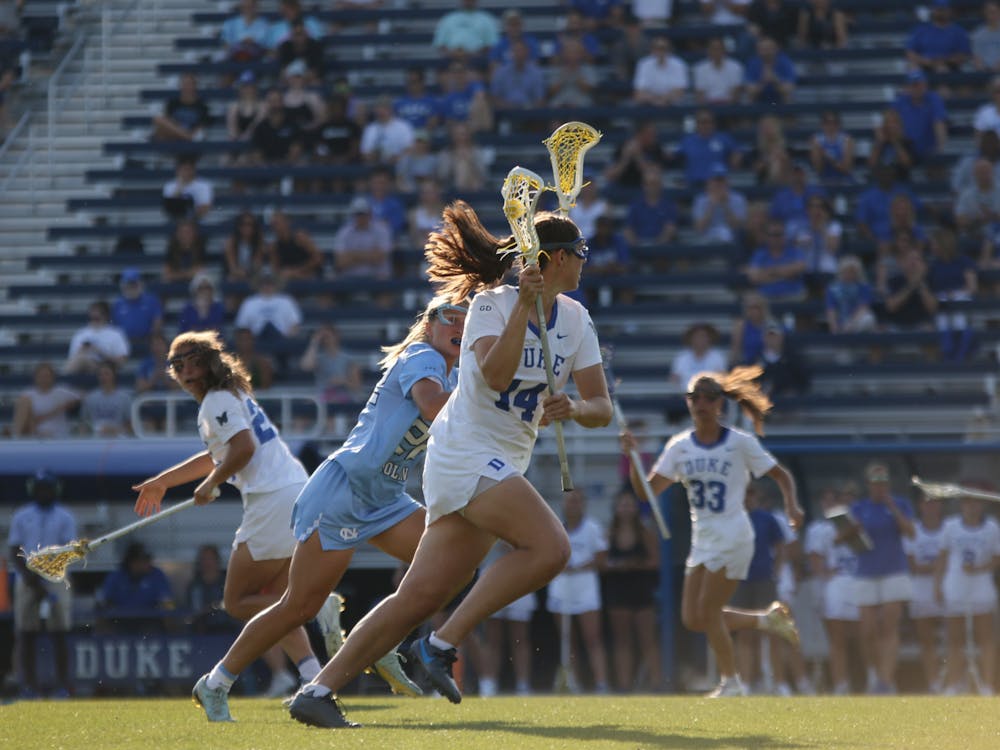On Saturday afternoon, Duke’s season became a losing one. The Blue Devils traveled to Louisville where the Cardinals delivered them their eighth loss of the year in a tight 14-13 battle that put their season record at 7-8, which is now 7-9 after a Thursday loss against North Carolina. Given the trajectory of the last couple of months, these defeats do not come as much of a surprise. Hopes were high at the start of the season for this Blue Devil squad, whose early NCAA tournament exit last year was largely regarded as an unfortunate ending to a wildly successful season. Now, Duke is struggling to win against other ACC teams. Aside from a tight victory against Pittsburgh, it has not yet claimed a win over another conference competitor. So what is going on with the Blue Devils?
Making things happen
Given that graduate attacker Maddie Jenner wins nearly every draw she gears up for — she has won 173 in this season alone — it’s clear that the offensive challenge for the Blue Devils comes into play once they gain possession.
The issue is something more along the lines of inefficiency. Head coach Kerstin Kimel’s offensive lineup certainly has its stars, with junior attacker Katie DeSimone standing comfortably at the helm. There is a talented line backing up the St. Anthony’s product on offense — including senior midfielder Lexi Schmalz and graduate attacker Anna Callahan — but it is relatively slim. These Blue Devils can score, but only if the opportunity presents itself, which is becoming increasingly rare.
Duke simply cannot fight ACC defenses the way it could a year ago. Kimel’s current squad averages 13.9 goals a game, whereas her team last season averaged 18 — a hefty four-goal difference that would alter the result in six of its losses this year.
On top of that, the Blue Devils are struggling to keep the ball in its crib. They are averaging 15.1 turnovers and 14.1 ground balls per game, while only forcing an average of 14 turnovers and 13.3 ground balls from their opponents. When it comes to team effort, Duke is lacking as well. Sure, a solid number of players know how to make shots fly at the net; however, fewer are able to facilitate those opportunities for their teammates. Out of 222 goals this season, only 104 of them have been assisted. On the other hand, a generous 44 of them have been from free position shots.
Protecting the net
This is the second time in two years that the roster has been plagued with injuries and illnesses that have put the Blue Devils in a tricky spot. Most notably, graduate goalkeeper Sophia LeRose has missed the bulk of the season due to an undisclosed medical condition. This has kept her out of the net for seven entire games as well as keeping her on the bench for major minutes in four other matchups.
In her last couple of seasons, the San Diego native has had a shot-saving percentage that dances around the mid-40s; in 2023, LeRose is stopping 41.5% of shots on goal. In her recent absence — from which she has now returned — senior goalkeeper Shaye Fitzpatrick stepped up to fill her shoes. Because she came in as a back-up option rather than a consistent starter like LeRose, expectations for Fitzpatrick did not reign quite as high. She has, however, superseded them.
The Batavia High School product has saved 43.6% of the shots chucked at her by opponents this season, a notch higher than LeRose. Other numbers stack up to support Fitzpatrick’s success in the net as well. Whereas LeRose allows an average of 12.6 goals per game during 32:43 minutes, Fitzpatrick allows 11.1 in an average 33:33-minute period. The Illinois native is performing just as efficiently as her more veteran teammate, even slightly more so. Thus while LeRose’s temporary loss was certainly felt by the Blue Devils, it does not account for the discrepancy between their season expectations and this wholly underwhelming performance.
The truth of the matter is about as simple as it comes: Duke is not winning because the team is not playing at the offensive caliber it was projected to. This disappointing season for Kimel is not a result of bad luck, and the proof for that is in the pudding — or actually, in the numbers.
Get The Chronicle straight to your inbox
Signup for our weekly newsletter. Cancel at any time.

Sophie Levenson is a Trinity sophomore and a sports managing editor of The Chronicle's 120th volume.

